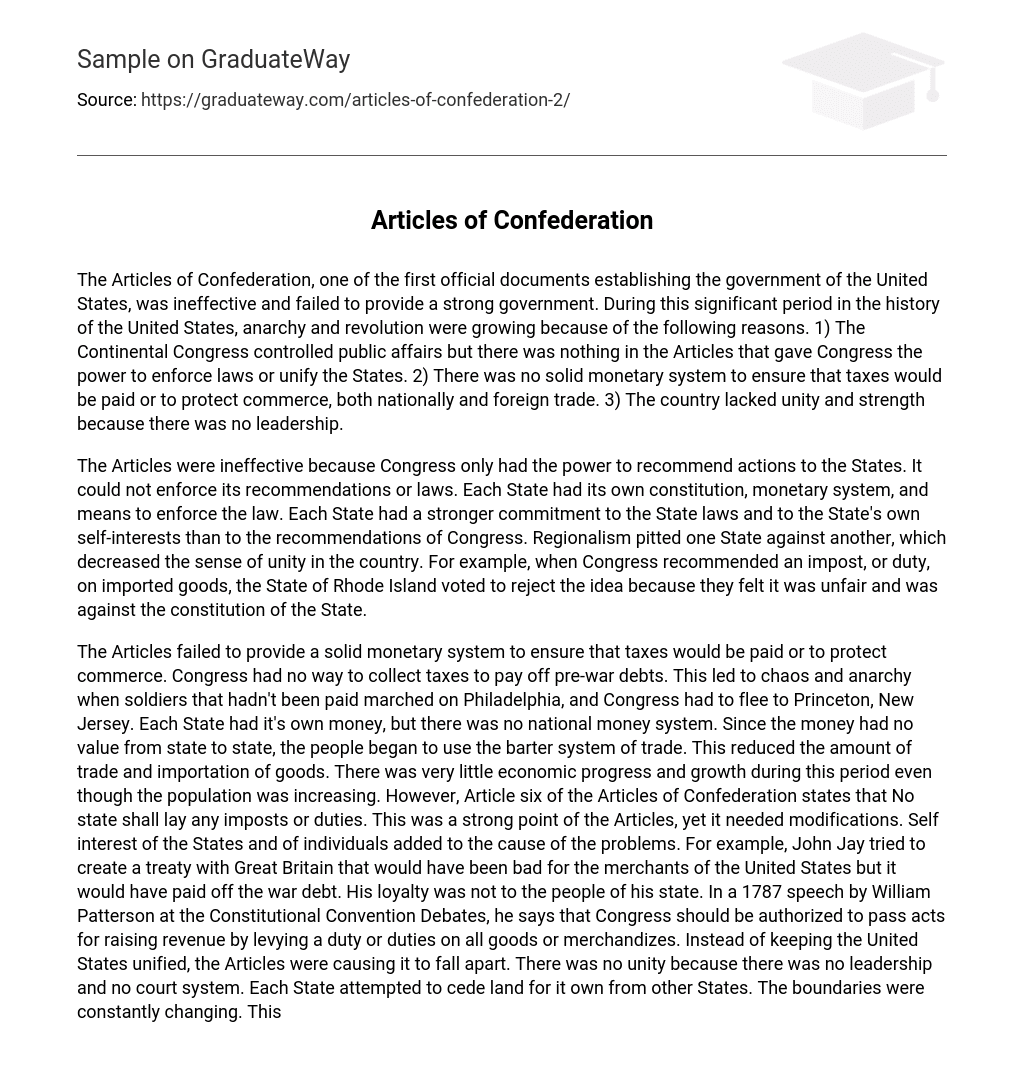The Articles of Confederation, one of the first official documents establishing the government of the United States, was ineffective and failed to provide a strong government. During this significant period in the history of the United States, anarchy and revolution were growing because of the following reasons.
- The Continental Congress controlled public affairs but there was nothing in the Articles that gave Congress the power to enforce laws or unify the States.
- There was no solid monetary system to ensure that taxes would be paid or to protect commerce, both nationally and foreign trade.
- The country lacked unity and strength because there was no leadership.
The Articles were ineffective because Congress only had the power to recommend actions to the States. It could not enforce its recommendations or laws. Each State had its own constitution, monetary system, and means to enforce the law. Each State had a stronger commitment to the State laws and to the State’s own self-interests than to the recommendations of Congress. Regionalism pitted one State against another, which decreased the sense of unity in the country. For example, when Congress recommended an impost, or duty, on imported goods, the State of Rhode Island voted to reject the idea because they felt it was unfair and was against the constitution of the State.
The Articles failed to provide a solid monetary system to ensure that taxes would be paid or to protect commerce. Congress had no way to collect taxes to pay off pre-war debts. This led to chaos and anarchy when soldiers that hadn’t been paid marched on Philadelphia, and Congress had to flee to Princeton, New Jersey. Each State had it’s own money, but there was no national money system. Since the money had no value from state to state, the people began to use the barter system of trade. This reduced the amount of trade and importation of goods. There was very little economic progress and growth during this period even though the population was increasing.
However, Article six of the Articles of Confederation states that No state shall lay any imposts or duties. This was a strong point of the Articles, yet it needed modifications. Self interest of the States and of individuals added to the cause of the problems. For example, John Jay tried to create a treaty with Great Britain that would have been bad for the merchants of the United States but it would have paid off the war debt. His loyalty was not to the people of his state.
In a 1787 speech by William Patterson at the Constitutional Convention Debates, he says that Congress should be authorized to pass acts for raising revenue by levying a duty or duties on all goods or merchandizes. Instead of keeping the United States unified, the Articles were causing it to fall apart. There was no unity because there was no leadership and no court system. Each State attempted to cede land for it own from other States. The boundaries were constantly changing. This had a negative effect on the loyalty of the people, and on the economics of each area. Without a national court system, laws that kept the nation secure could not be made or enforced.
In Brutus 1, the New York Journal, an anonymous author states, The judicial power of the United States is to be vested in a supreme court, and in suck inferior courts as Congress may from time to time ordain and establish. Since there was no president, there was no one to take a stand against the enemies of the United States or to make executive decisions regarding the States. The government could have easily been overthrown by foreign powers. For example, the British still held posts within the boundaries of the States and the Spanish had control of the lower half of the Mississippi River.
Without leadership, Congress could not act to gain control of the use of the River. The best Congress could do was to try to negotiate a treaty with the Spanish, but this was not effective. From 1781 to 1789, the Articles of Confederation provided the United States with an ineffective, and often chaotic, form of government. After the Revolutionary war the unity of the people began to disappear.
The States were separated with slow means of transportation and communication, and each State had its own monetary system and its own interests. No economic progress was possible without a unified monetary system. Congress had no power to unify the States to collect taxes, or to enforce laws and recommendations. Without strong leadership or a national court system, there was no way to make changes that were necessary to improve the country. The Articles of Confederation needed to be revised if the country was to survive.
Quote I recommend: In Brutus 1, the New York Journal, an anonymous author states, The judicial power of the United States is to be vested in a supreme court, and in suck inferior courts as Congress may from time to time ordain and establish.
Document I recommend: Thomas Jeffersons letter to James Madison, Dec. 20, 1787, because it clearly and specifically listed everything Madison liked about the Articles and what ideas he wanted to instill in the Constitution.





